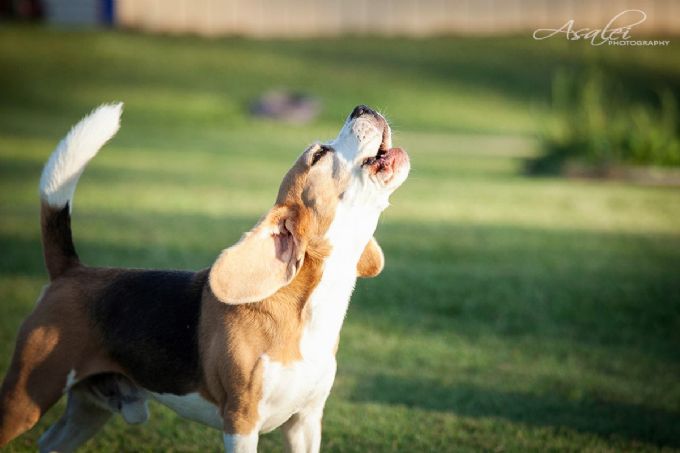About the Breed
Sub-links for this page

History
The Beagle is a very old purebred dog, first records of it can be found more than 2000 years ago in Ancient Greece. In Britain, it has been used as a hunting hound since the 14th Century, and packs of them are still used to hunt hare. However, the beagle has been domesticated very successfully during recent years and is now a very popular pet and show dog.
Appearance and Size
In appearance, the Beagle is a lively, sturdy-looking hound having several colours. The most common is tri-colour, a combination of black, tan, and white, but there are other combinations, such as tan and white, and lemon and white, which are extremely attractive.
The stern (tail) should always have a white tip and the eyes should be dark. Its coat is short, dense, and waterproof, making it easy to groom and keep clean.
It is of medium size, being between 33 cm (13") and 41cm (16") high, measured from the top of the shoulder vertically to the ground, thus it can fit easily into most households and cars.
Characteristics & Temperament
One of the beagle's greatest attributes is their extremely good temperament. They are bold, with an even temperament, and a merry disposition. For this reason, they make excellent family pets and are wonderful with children.
Because the beagle was bred as a pack animal, it is important that he receives plenty of company. This can be from his human family or from other dogs (preferably beagles, of course!). If your family and lifestyle mean that nobody is home for long periods during the day, or if you want the dog outside and you inside, then the beagle is not for you. If you are regularly away from home for long periods and must have a beagle, then it is highly recommended that you get two. This is not meant to be a sales pitch to sell another dog - if he has the company of a friend while you are away, he will be much more settled, dig far fewer holes, bark a lot less, and won't get as fat.
A beagle must be able to roam free in a securely fenced backyard and/or in the house. Chaining a beagle to a kennel for long periods is cruel. They are not adapted to this form of living. The yard must also be escape-proof. If you cannot provide an escape-proof backyard without having to chain your dog up, do not buy a beagle
Beagles were bred to hunt regularly over long periods of time and have developed a high level of stamina which needs regular exercise. Regular walks on a lead are important, especially for the young beagle. A beagle is a scent hound, and once on a scent, he focuses only on this. It is almost as though his ears and eyes are closed to the world as he works diligently on the scent before him. For this reason, for his own safety, walks on a lead are a necessity, as is a well-enclosed backyard.
Your beagle puppy must be handled with firmness and with love or you will find that your lovely puppy has grown into a disobedient and unruly dog. A little extra time spent with your puppy, teaching it what it can and can't do will lead to a happy mature beagle, and a happy owner.
Before reading any further ask yourself the following questions:
- Do you have a jump-proof, dig-proof, chew-proof fence which completely encloses your backyard and is at least 5 feet high?
- Will your new dog have company for most of the day? This can be either human or another dog (preferably a beagle of course!)
- Are you prepared to walk your dog on a lead at all times?
- Are you happy to live with a back lawn that may at times resemble a lunar landscape, covered in craters and pot holes?
- Are you prepared to make sure all your shoes, toys, and anything else you don't want chewed are not left within beagle range?
- Are you able to resist pleading brown eyes that try to convince you they are perpetually hungry?
- Are you prepared to put some time and effort in training your new dog, letting them know who is in control?
- The average lifespan of a beagle is 10 to 15 years. Are you sure that any long-term plans you might have will not affect your beagle?
If you answered "NO" to any of the above questions, then I strongly suggest that you think twice about getting a beagle. Chances are a beagle is NOT FOR YOU!
Photo credit - Erin Ison (Asalei Beagles)
